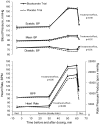Acute sodium bicarbonate loading has negligible effects on resting and exercise blood pressure but causes gastrointestinal distress
- PMID: 23746564
- PMCID: PMC3680785
- DOI: 10.1016/j.nutres.2013.04.009
Acute sodium bicarbonate loading has negligible effects on resting and exercise blood pressure but causes gastrointestinal distress
Abstract
Oral ingestion of sodium bicarbonate (bicarbonate loading) has acute ergogenic effects on short-duration, high-intensity exercise. Because sodium bicarbonate is 27% sodium, ergogenic doses (ie, 300 mg∙kg⁻¹) result in sodium intakes well above the Dietary Reference Intakes upper limit of 2300 mg/day. Therefore, it is conceivable that bicarbonate loading could have hypertensive effects. Therefore, we performed a double-blind crossover trial to evaluate the hypothesis that bicarbonate loading increases resting and exercise blood pressure (BP). A secondary hypothesis was that bicarbonate loading causes gastrointestinal distress. Eleven endurance-trained men and women (exercise frequency, 4.6 ± 0.4 sessions/wk; duration, 65 ± 6 min/session) underwent testing on two occasions in random sequence: once after bicarbonate loading (300 mg∙kg⁻¹) and once after placebo ingestion. BP and heart rate were measured before bicarbonate or placebo consumption, 30 minutes after consumption, during 20 min of steady state submaximal cycling exercise, and during recovery. Bicarbonate loading did not affect systolic BP during rest, exercise, or recovery (P = .38 for main treatment effect). However, it resulted in modestly higher diastolic BP (main treatment effect, +3.3 ± 1.1 mmHg, P = .01) and higher heart rate (main treatment effect, +10.1 ± 2.4 beats per minute, P = .002). Global ratings of gastrointestinal distress severity (0-10 scale) were greater after bicarbonate ingestion (5.1 ± 0.5 vs 0.5 ± 0.2, P < .0001). Furthermore, 10 of the 11 subjects (91%) experienced diarrhea, 64% experience bloating and thirst, and 45% experienced nausea after bicarbonate loading. In conclusion, although a single, ergogenic dose of sodium bicarbonate does not appear to have acute, clinically important effects on resting or exercise BP, it does cause substantial gastrointestinal distress.
Copyright © 2013 Elsevier Inc. All rights reserved.
Conflict of interest statement
The authors have no conflicts of interest to declare.
Figures

Similar articles
-
International Society of Sports Nutrition position stand: sodium bicarbonate and exercise performance.J Int Soc Sports Nutr. 2021 Sep 9;18(1):61. doi: 10.1186/s12970-021-00458-w. J Int Soc Sports Nutr. 2021. PMID: 34503527 Free PMC article. Review.
-
Increased blood pH but not performance with sodium bicarbonate supplementation in elite rugby union players.Int J Sport Nutr Exerc Metab. 2010 Aug;20(4):307-21. doi: 10.1123/ijsnem.20.4.307. Int J Sport Nutr Exerc Metab. 2010. PMID: 20739719 Clinical Trial.
-
Effect of sodium bicarbonate on prolonged running performance: A randomized, double-blind, cross-over study.PLoS One. 2017 Aug 10;12(8):e0182158. doi: 10.1371/journal.pone.0182158. eCollection 2017. PLoS One. 2017. PMID: 28797049 Free PMC article. Clinical Trial.
-
Sodium bicarbonate supplementation improved MAOD but is not correlated with 200- and 400-m running performances: a double-blind, crossover, and placebo-controlled study.Appl Physiol Nutr Metab. 2015 Sep;40(9):931-7. doi: 10.1139/apnm-2015-0036. Epub 2015 May 12. Appl Physiol Nutr Metab. 2015. PMID: 26300016 Clinical Trial.
-
Nutritional Strategies to Modulate Intracellular and Extracellular Buffering Capacity During High-Intensity Exercise.Sports Med. 2015 Nov;45 Suppl 1:S71-81. doi: 10.1007/s40279-015-0397-5. Sports Med. 2015. PMID: 26553493 Free PMC article. Review.
Cited by
-
Effects of dietary Acid load on exercise metabolism and anaerobic exercise performance.J Sports Sci Med. 2015 May 8;14(2):364-71. eCollection 2015 Jun. J Sports Sci Med. 2015. PMID: 25983586 Free PMC article.
-
The effects of sodium bicarbonate ingestion on swimming interval performance in trained competitive swimmers.Eur J Appl Physiol. 2023 Aug;123(8):1763-1771. doi: 10.1007/s00421-023-05192-6. Epub 2023 Apr 7. Eur J Appl Physiol. 2023. PMID: 37027014 Free PMC article. Clinical Trial.
-
Sodium Bicarbonate Ingestion Improves Time-to-Exhaustion Cycling Performance and Alters Estimated Energy System Contribution: A Dose-Response Investigation.Front Nutr. 2020 Sep 8;7:154. doi: 10.3389/fnut.2020.00154. eCollection 2020. Front Nutr. 2020. PMID: 33015125 Free PMC article.
-
Greater lactate accumulation following an acute bout of high-intensity exercise in males suppresses acylated ghrelin and appetite postexercise.J Appl Physiol (1985). 2020 May 1;128(5):1321-1328. doi: 10.1152/japplphysiol.00081.2020. Epub 2020 Apr 2. J Appl Physiol (1985). 2020. PMID: 32240018 Free PMC article. Clinical Trial.
-
International Society of Sports Nutrition position stand: sodium bicarbonate and exercise performance.J Int Soc Sports Nutr. 2021 Sep 9;18(1):61. doi: 10.1186/s12970-021-00458-w. J Int Soc Sports Nutr. 2021. PMID: 34503527 Free PMC article. Review.
References
-
- McNaughton LR, Siegler J, Midgley A. Ergogenic effects of sodium bicarbonate. Curr Sports Med Rep. 2008;7:230–236. - PubMed
-
- Carr AJ, Hopkins WG, Gore CJ. Effects of acute alkalosis and acidosis on performance: a meta-analysis. Sports Med. 2011;41:801–814. - PubMed
-
- Peart DJ, Siegler JC, Vince RV. Practical recommendations for coaches and athletes: a meta-analysis of sodium bicarbonate use for athletic performance. J Strength Cond Res. 2012;26:1975–1983. - PubMed
-
- Bishop D, Claudius B. Effects of induced metabolic alkalosis on prolonged intermittent-sprint performance. Med Sci Sports Exerc. 2005;37:759–767. - PubMed
-
- Van Montfoort MC, Van Dieren L, Hopkins WG, Shearman JP. Effects of ingestion of bicarbonate, citrate, lactate, and chloride on sprint running. Med Sci Sports Exerc. 2004;36:1239–1243. - PubMed
Publication types
MeSH terms
Substances
Grants and funding
LinkOut - more resources
Full Text Sources
Other Literature Sources
Medical

